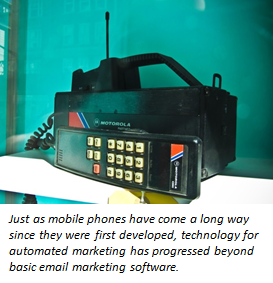Often when I am out speaking about marketing automation, people will ask me, “If email is still a big part of engaging prospects, why can’t I just keep using MailChimp?”
To answer, I like to compare marketing automation and email marketing software to cell phones.
Think of free or very low-cost versions of email marketing software such as MailChimp, Constant Contact, and iContact as basic “dumb” cell phones that can do little more than send/receive calls and texts. With premium packages, you get more functionality, but it’s limited—like the functionality of a “feature” phone such as a Nokia. Marketing automation software, on the other hand, is like a smartphone that can do tons of things.
 Basic email marketing software only allows for batch (i.e., un-segmented) emails and can only track clicks and opens. Advanced email marketing software can do a little more, such as automatically responding with an email when the recipient takes a certain action. You can even do “drip campaigns” where you send out emails at prescheduled times.
Basic email marketing software only allows for batch (i.e., un-segmented) emails and can only track clicks and opens. Advanced email marketing software can do a little more, such as automatically responding with an email when the recipient takes a certain action. You can even do “drip campaigns” where you send out emails at prescheduled times.
Recently, some email marketing software offers integration into customer relationship management (CRM) software, although there's still no real ability to create rules, segment leads, or capture useful data for marketing.
Email marketing software can be effective at what it does, just as dumb phones can do the job of calling and texting very well and feature phones have additional useful functions. But email marketing software can’t begin to compare to what marketing automation software can do.
Unlike email marketing software, marketing automation can:
- Manage website and social media marketing in addition to email.
- Quickly and easily create landing pages for your website without development assistance.
- Segment emails based on a wide variety of lead/customer characteristics (e.g. customer personas, past buying behavior, role in purchasing decision).
- Track every online interaction leads or customers have with a company and take automated action based on their responses, such as visiting a specific web page or downloading a piece of content.
- Score leads based on their online interactions, with certain scores (which you set) triggering specific actions and targeted content (which you determine).
- Provide reporting and analysis of all marketing efforts, not just email.
Why Is This Important?
Even though I’m a big proponent of marketing automation, I know that marketing automation isn’t for every company.
- Very small businesses looking to begin digital marketing are probably best starting with email marketing software.
- If you have a niche product or service and are only marketing to a very specific customer persona, without multiple influencers, you probably can get by without marketing automation.
- If you have a product that doesn’t require a lot of research by customers—and that has a simple, transactional buying process, where you take prospects from awareness to sale very quickly—email marketing software is usually sufficient.
But if you’re a business that’s reached that point in your growth where you need a full-fledged marketing strategy for B2B lead generation and nurturing, marketing automation will help you grow your business with marketing better than email marketing software—and make your life easier!
Marketing automation frees your marketing team to focus on more-complex tasks than tracking and responding to lead behavior. When any combination of conditions you’ve predetermined are met, marketing automation triggers events you’ve planned, such as including them in email nurturing campaigns or scheduling a sales call.
By integrating tightly with CRM software, marketing automation facilitates sales and marketing alignment, which is crucial in effective lead management to increase lead volume and conversion rates.
What Can You Do?
One thing I’ve seen far too often is businesses that make the right decision to invest in marketing automation but then underutilize it—treating it as if it’s nothing more than email marketing software. They’re like someone with a smartphone who hasn’t installed any apps on it yet.
Another mistake I’ve often seen is businesses that use marketing automation software “properly” but don’t have a solid strategic marketing plan. The software is not an end in itself—it supports the strategy. If the strategy is flawed, marketing automation won’t fix that.
It’s up to you to determine if you have a sufficient combination of technical and marketing expertise to implement marketing automation without assistance. Many businesses turn to a marketing automation agency such as One Red Bird to not only help with the marketing automation implementation and management, but also to provide managed marketing services such as strategy development, content creation, brand design, and website development.
The Bottom Line
A funny thing I’ve noticed is that many people reach a point where they understand enough about their marketing goals and the available technology that they decide they can probably make do with email marketing platforms like MailChimp for a little longer. They understand what advanced email marketing software can do, and they have a vision for how to use it to their advantage.
But with this understanding of their marketing objectives and the technology, they come to realize how much more they could do with marketing automation. And there’s no reason they shouldn’t have it.
As with any good business solution, the investment in marketing automation will pay for itself in the benefits gained, so the lower upfront cost of email marketing software usually isn’t a justification for investing in it instead of marketing automation.
Image courtesy of garryknight, Creative Commons.


